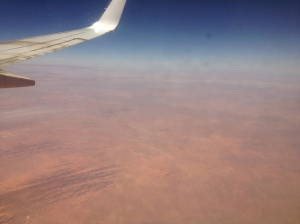
Thanks to the support of the FiSahara Film Festival and the Arab Studies Institute, I spent about a week in the Dakhla Sahrawi refugee camp, about 170 kilometers outside of Tindouf in southern Algeria. I went in my capacity as a freelance writer, graduate student, and activist. During my time there, I stayed with a Sahrawi refugee family and met a number of Sahrawi refugees, international filmmakers, journalists, and members of the Polisario and Sahrawi Arab Democratic Republic government.
Going into this trip, I carried with me a series of baggages that weren’t the kind you could measure on a scale. My privilege was the biggest baggage. As a Moroccan-American, I came from two countries who have being powerful actors in the Western Saharan conflict: Morocco, the country that invaded the Western Saharan territory in 1975, and the United States, the country that largely supplies the military and financial aid that allows Morocco to sustain its (violent) presence in the territory. The other baggage I carried with me was my ignorance. Having largely been informed of the conflict through the Moroccan side, I held severe misconceptions that colored my understanding of the conflict and the Sahrawi population in general. Among these misconceptions were that mobility within the refugee camps was severely restricted, that the area surrounding the camp was a hotbed of insecurity and violence, and that my presence in the camps as a Moroccan would trigger negative responses and reactions among the Sahrawi population. I also went into this trip with the overarching anxiety about what the consequences would be for me during my next visit to Morocco and the issues my family living in Morocco would face. Without even having visited the camps, members of my family and neighbors have already been subjected to unannounced visits from Moroccan intelligence services and their incessant questions about me and my work. While I have plenty to recount about the political atmosphere, the conditions under which Sahrawis live in the refugee camps, the role of the Polisario, the socioeconomic realities Sahrawis face, and questions of women’s rights and gender, among others–which I will discuss in forthcoming articles–this post, along with future posts on this blog are meant to focus on my personal experiences. Continue reading Part 1: Notes from the Western Saharan Refugee Camps
 During the beginning of October 2013, two teenagers from the northern city of Nador were
During the beginning of October 2013, two teenagers from the northern city of Nador were